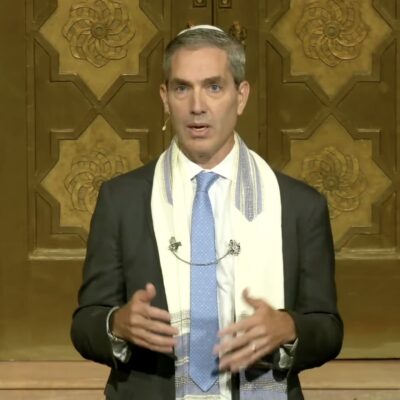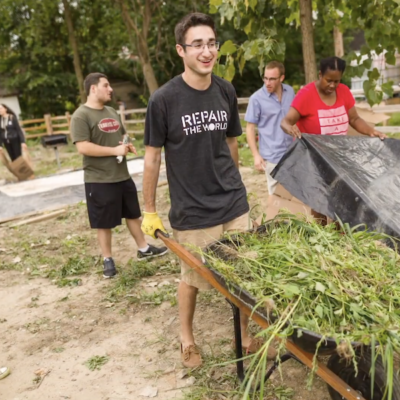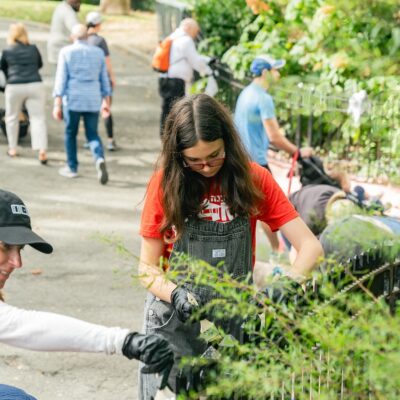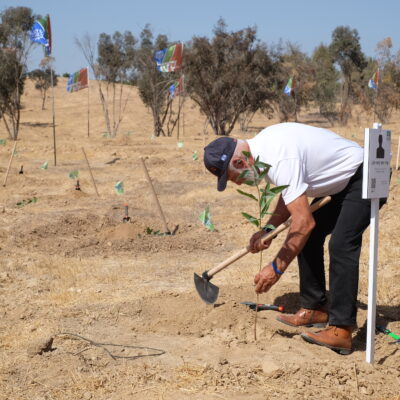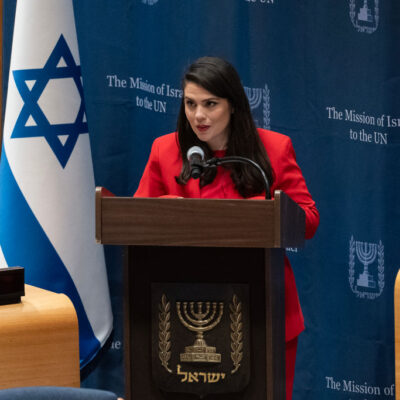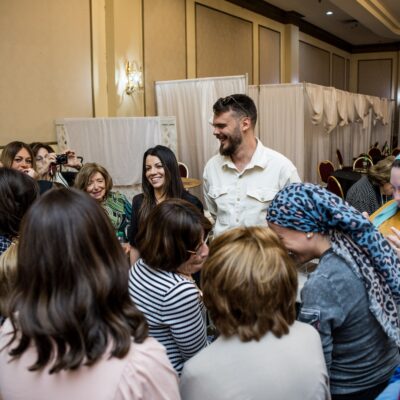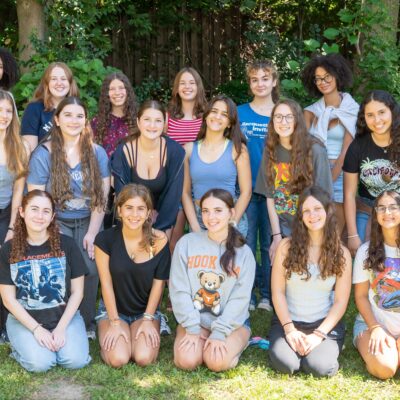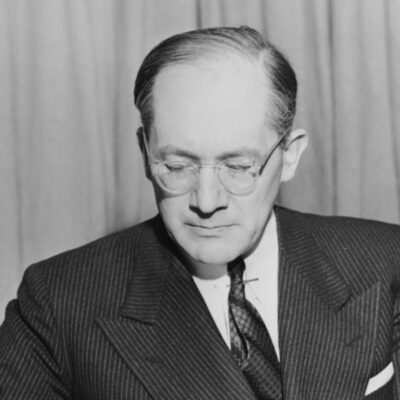Single. Female. Rabbi.

[This essay is from Contact, a publication of The Steinhardt Foundation for Jewish Life. Reprinted with permission.]
What the experience of unmarried women rabbis tells us about contemporary Jewish life
By Shira Dicker
Rabbi Raquel Fein faces an empty sanctuary. Her hair is pulled back into a careless ponytail, her face scrubbed clean of make-up. Wearing running clothes, she squints as the early morning light filters in through the stained-glass windows. She begins speaking haltingly: “Thoughts on Passover. You wake up with two words emblazoned on your chest. It’s time. You’re gonna make a break for freedom. You will not be a slave anymore.”
Now she is outside, walking through the woods. Her voice grows confident.
“Get out of bed, grab your things, run outside and then, there you are. Free.”
Millions of people got to share the experience of a rabbi drafting a sermon owing to the fact that Rabbi Raquel Fein is a beloved character on the award-winning series Transparent. Played with exquisite sensitivity and nuance by Kathryn Hahn, she is both groundbreaking and relatable, not only because of her gender but also because of her marital status.
Like many of her real-life counterparts, Rabbi Raquel is professional, intelligent, accomplished, attractive, empathetic, grounded, grown-up, caring, complex, loving.
And single.
Rabbi Leah Rachel Berkowitz of Congregation Kol Ami in Elkins Park, Pennsylvania, hails the creation of this fictional character as an important sign that the story of the single woman rabbi is finally being told. She salutes Transparent for its ability to show the complexity and blessings inherent in the lives and work of contemporary female rabbis who are single.
“This show gets it right,” says Berkowitz. In renderings of women who are rabbis, “there’s a tendency to fetishize their sexuality or simply not view them as protagonists,” she says.
Very much a protagonist in her own publicly documented life, the 36-year-old Berkowitz, a Reform rabbi who was ordained at Hebrew Union College in 2008, writes frequently about the experiences of being a young female rabbi on her blog, “This is What a Rabbi Looks Like,” and for the Jewish Women’s Archive, for newspapers, and for other publications. A contributor to the anthology The Sacred Calling: Four Decades of Women in the Rabbinate (CCAR Press, 2016), she is especially outspoken about her singledom.
In an April 2017 column, “Shabbat is a Two-Person Job,” Berkowitz writes about the challenges of making Shabbat solo while balancing pulpit responsibilities. In May of this year, she wrote a scathing account (“Dear Male Comedian”) of being at the receiving end of crude humor at a Jewish conference:
“You’re a rabbi?” you asked. I nodded…“Wow, you’re really pretty,” you said. “Are you married?” My readers can tell you that I don’t love that question. “No, I am not.” I smiled through gritted teeth. You couldn’t read my body language, but I was shooting daggers at you with my eyes. I didn’t like where this was going. “Oh,” you said. “Maybe I’ll divorce my shiksa wife and marry you!”
But Berkowitz also writes warmly about the gift of the network of single rabbinic gal pals she has cultivated who support one another; the luxury of having long, lazy Shabbat afternoons to herself; and the ability to choose vacations that truly recharge her soul, such as writing retreats.
“It’s not like I opted into a single place. This is how life unfolded and it has its great and its hard parts,” Berkowitz said.
Although the pressures facing unwed rabbis are not confined to a single gender, and single male rabbis face their own challenges, the experiences of unwed women rabbis are a relatively new phenomenon that merits exploration. Although exact numbers are not available (as the marital status of rabbis is not tracked by denominational organizations or social scientists), unmarried female rabbis are a noteworthy and increasingly visible demographic. With women being ordained across the wide spectrum of Jewish denominational life, their complex – and fulfilling – experiences are being shared now.
“I have time for excellence in my career,” states Rabbi Cookie Lea Olshein, 50, of Temple Israel in West Palm Beach, Florida. “I am not pulled by a spouse. I give my heart and soul to my congregation. I believe in the mission of the Jewish people.”
Ordained 10 years ago from Hebrew Union College, Olshein came to the rabbinate after an 11-year career in law, a common trajectory. She reports having heard the timeworn advice about seeking a spouse while still in rabbinical school during her time at HUC. “People were wise in telling me that,” she says, before detailing the challenges of finding a compatible partner when one is a highly educated spiritual and community leader.
“I have four degrees; it is hard to find a man who is single, age appropriate, interested in being heavily involved in Jewish life or at least not averse to it!” she explains.
Yet as Olshein shares that she never thought she would be single at 50, she also admits to being picky in her choice of partners. “I recently ended a three-year relationship that just wasn’t right. I’m not willing to settle. I’ve seen too many unhappy people in my field. I’d rather not be in a relationship than be in an unhappy one.”
As a single woman, Olshein serves a unique role within a congregation where many women are widowed. “The older women who have lost their husbands are usually devastated. I talk to them about reinventing themselves as happy single people,” she says.
Northwest of West Palm Beach, at Congregation Kol HaNeshama in Sarasota, Rabbi Jennifer Singer, divorced after a 31-year marriage, finds that she is serving a similar role within her community. A 2017 ordainee of ALEPH: The Alliance for Jewish Renewal in Philadelphia, she says that “one of the benefits of living in ‘God’s Waiting Room’ is that there are lots of ladies living alone.”
The split with her husband came with her move towards Judaism. Prior to entering rabbinical school, Singer had been a Jewish communal professional, working in endowments and major gifts for the Federation of Jewish Philanthropies and the Technion. But “at one point everything I did was Jewish and it made him crazy,” she said, and they split up. With her kids going off to college in 2011, there is now “no one at home. Just me and the dogs.”
Though Singer, at 61, is one of the youngest of the single women at Kol HaNeshama, in her community she is “one of them.” As a survivor of aggressive breast cancer with a double mastectomy and no reconstructive surgery, she is also a visible role model for those struggling with their mortality.
Even with her accessibility, Singer explains that she is still “The Rabbi,” and her community has expressed concern about her dating, she says, recounting a fascinating conversation on the subject of what stand it would take if she began dating a non-Jewish man.
“When your first name is “Rabbi,” it tends to desexualize and depersonalize you a bit,” says Singer. Recently, an attractive widower slightly older than her began attending services at her synagogue. A congregant, noting him, exclaimed, “Oh! I have to hook him up with someone,” while Singer stood there thinking, “What am I? Chopped liver?”
Singer recounts several funny/not funny stories of dating debacles. One man responded to the news that she was a rabbi by showing up with a manila folder filled with homework for his adult Bar Mitzvah and then brought along a shofar on the second date. Reporting that her younger, single colleagues are anxious about dating, she adds that “they also have a huge thing with getting touched,” validating the fact that for female rabbis, broaching boundaries – physical as well as otherwise – is an ongoing issue.
Like Berkowitz, Rabbi Eve Eichenholtz is in her thirties. Though young, her unmarried state has led congregants to speculate as to her sexual orientation. Like all the rabbis interviewed for this article, Eichenholtz is heterosexual, yet the assumption that an unmarried female rabbi must be a lesbian is common. Rabbi Nina Mandel, a divorced rabbi ordained at the Reconstructionist Rabbinical College in 2003 who serves a non-affiliated rural congregation in central Pennsylvania, playfully posits that this is a game congregations like to play. “I call it: ‘Guess the Rabbi’s Sexual Orientation’,” she says, “Or, ‘What’s the Story with our Rabbi?’”
Onlookers might also pin lack of a sexual life on a single female rabbi – and sometimes they are correct. A 40-something, never-married, Conservative rabbi, who declined to be named for this article, said that celibacy is often a sad fact of the life of a single female rabbi. “Nobody talks about sexuality,” she says. “For a good number of women in their 40s and 50s, their sex lives suck. It’s an issue.”
Ordained at the non-denominational Academy of Jewish Religion in New York in 2013, Eichenholtz arrived at her current pulpit – Beth Israel Congregation in Fayetteville, North Carolina – the following year. For Eichenholtz, the social fluidity of Fayetteville is key. “People lead single lives here, even if they are married. I’m very aware that that’s one of the reasons I feel so relaxed in this community,” she says.
Location can indeed influence the happiness of the single female rabbi, said a pioneering personality in the Conservative Jewish world who also declined to be named for this article. Now in her 60s, this rabbi said that she sought out rabbinic opportunities in major urban centers so she would be one single Jewish adult among many. “There are different family configurations in urban settings,” she says. “I have never once felt the kind of isolation or social pressure that would have been prevalent in a suburban setting.”
This rabbi reflects on the difficulties faced by some of the best and brightest female rabbis in finding life mates. “The dirty little secret is that guys don’t want to marry us. I think that men figure that if they are going to spend their lives with a woman who is married to her job, he might as well pick a lawyer who will make serious money and command more status,” she opines.
And while she speaks warmly about colleagues who have loving marriages, she also reveals another dirty secret: some female rabbis end up marrying men who are far from their ideal mates because it is so difficult to meet someone ambitious and accomplished who is also willing to accommodate the demands of his wife’s career.
For Rabbi Sally Priesand, whose name is synonymous with “female rabbi,” compromise was never an option.
Ordained from HUC-JIR in 1972, Priesand became the first female rabbi in the United States. Retired from the Monmouth Reform Temple, where she is rabbi emerita, she speaks frankly about what she had imagined her life would be like as a younger woman.
“When I was in rabbinical school, I assumed I would get married and have children, and I used to say that in my synagogue there was going to be a nursery next to my study so I could bring my children with me,” she says.
Priesand speaks about having dated “some of my fellow students,” and having come “close a couple of times to getting married, but always chose my career over that. Once I got into pulpit life, I realized that I could never have a family and a synagogue and do both well. I just had to know myself … it doesn’t mean others can’t do it. I couldn’t do it. I give everything I have to the synagogue. I don’t regret it because I feel that all of the children I have helped educate are like my children, too.”
Even without biological children, those who count themselves among Priesand’s spiritual offspring are many. “None of us can truly understand what it can be to be the first,” states Rabbi Mary Zamore, head of the Women’s Rabbinic Network of Reform Judaism. “The path she blazed was for us. At the WRN, we appreciate the sacrifice she made and feel that we are her daughters.”
Thrust into the spotlight with her ordination, Priesand was a symbol of women’s empowerment and achievement even as she fulfilled the demanding daily tasks of the congregational rabbi. “I will say that in my life, dating was just not important. Neither was entertaining, though many rabbis think it is key.”
Even without traditional hostess skills, community and friends became an extended family for Priesand. “Certain people became really good friends of mine. I always spent 36 years with the same family on Pesach and have travelled for the Bar/Bat Mitzvah of grandchildren. I have a group of people who have remained my really good friends. In fact, one of the reasons why when I retired I stayed in my community, is that I feel they are all family to me.”
Priesand reflects upon the choice faced by female rabbis of an independent or partnered life. “This is very difficult for female colleagues,” she says. “It’s hard to do both. I find that people really appreciate my willingness to say that I had to make a choice. It’s alright to make a choice; I still struggle with it.”
Regarding the ability of female rabbis to find mates, she notes that some men still tend to be intimidated by accomplished women. “A lot of it is about power, but having women in these roles has allowed other men to be nurturing and to use that side of themselves where before they hid it. I see on Facebook very often that some of our male colleagues really want to understand (the gender gap) better.”
Directly across the denominational aisle from Priesand, Rabbanit Esther (not her real name) is a newly-ordained Orthodox rabbi from Yeshivat Maharat who is working at a large synagogue in a major city. Divorced after nearly 40 years of marriage, with grown children and grandchildren, she applied for her job wearing a head covering and removed it months later when her get came through.
“It is different for me than other single Orthodox women; I don’t fit the mold,” she says, by way of understatement. “I’m 59, ordained one year ago. Four years ago, I finished 30 years in high tech in Israel. I worked, raised a family and was married until half a year ago.”
Rabbanit Esther’s identity as a newly-divorced Orthodox woman has many dimensions, including that of lightning rod for congregants who are dealing with marital difficulties, she says. It has also made her a bit of a curiosity. When she first arrived, “women came over to me with questions: what’s the story, is there a husband, children? They did it in a nice way. They were curious.”
With her level of self-confidence and grounding in the world, Rabbanit Esther says that being publicly single in a frum community is something that those who have never been married may experience very differently. Also, in instances where boundaries were broached – she has had “one or two uncomfortable situations with a congregant I didn’t like, including a guy my age, struggling with divorce, who said ‘if I could, I would give you a hug’” – she has been able to maintain her equilibrium. People will often compliment her hair or outfits, another common experience for female rabbis, married or otherwise. If Men Rabbis Were Spoken To the Way Women Rabbis Are Spoken To, a video made at JTS in 2015 by rabbinical students, hilariously lampoons the ongoing objectification of female clergy by reversing gender roles.

“I invite people for meals. I don’t feel uncomfortable with men and women around my table, but sometimes I joke that I need a wife,” Rabbanit Esther says, a sentiment expressed by many other unmarried female rabbis. “The rabbinate is still structured imagining that there is a non-working spouse at home, taking care of household needs,” concurs Berkowitz.
Rabbanit Esther is candid about her interest in forging a new partnership. She is also open, even elated, about her newfound freedom. “I carry myself. I feel liberated. I do! There were things in my marriage that I wasn’t happy with and I needed to be free to be myself,” she says.
“I have a lot of agency in my life,” echoes Rabbi Jan Urbach, rabbi of the Conservative Synagogue of the Hamptons and a faculty member at JTS. A high-profile, second-career rabbi who practiced law for about nine years, including a stint clerking for Judge Kimba M. Wood and a partnership at a Park Avenue firm, Urbach says that she arrived at her pulpit “with the experience of singlehood,” and, like Priesand, doesn’t “know if I could have done it if married with children at home.”
“On the one hand, it was scary to make choices alone; on the other hand, it was freeing,” she says. She left her law firm in 1997 and was ordained in 2003 at the Jewish Theological Seminary. During that time, she was involved in helping to found the congregation she now serves, so she never went through the initial interview process coming out of rabbinical school like most of her peers.
Urbach speaks about how being a woman and a single person “created sensitivities in me.” Understanding marginal experiences and groups comes naturally to her, she says. And in a culture of two-by-two and traditional family units, “you might feel something is wrong with you if you are not that thing.”
A keenly developed outsider perspective is something Urbach has cultivated and refined. It informed her role as Associate Editor of Siddur Lev Shalem in 2016, and guides her recent social-action work.
Regarding being unmarried, Urbach says, “I wouldn’t say that I haven’t struggled with being single. There are times when I feel lonely and wish that I was partnered in that way.”
Still, says Urbach, we need to reframe singlehood as more than the failure to marry. “I think that if [marriage] was the first priority in my life, I would have made it happen. Many men want someone less successful, less smart. That was challenging. I had an unwillingness to restrict my being. There was never a question of that kind of trade-off. ”
The fortyish rabbi who flagged celibacy among her peers quipped that one of the most interesting – and available – men she recently met was an imam at a conference in Israel.
“The part about being single that’s hard is that it was never Plan A. Everyone, I think, wants to be in a committed loving relationship,” she says. “It’s human nature to continue to have desire and to want that.”
“Blessing doesn’t mean an easy life,” Urbach explains. “You learn in life that you don’t get everything you want.”
Shira Dicker is a restless writer-at-large and publicist captivated by contemporary culture. She has specialized in promoting social causes, events, books, documentary films, musicians, art exhibitions, religious leaders, and issues of pressing concern for the Jewish community. Shira is currently working on a memoir entitled “The Adopted Wife.”

 Add EJP on Google
Add EJP on Google